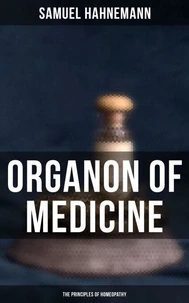Organon of Medicine: The Principles of Homeopathy. Exploring the Holistic Principles of Classical Homeopathy
Par : ,Formats :
Disponible dans votre compte client Decitre ou Furet du Nord dès validation de votre commande. Le format ePub est :
- Compatible avec une lecture sur My Vivlio (smartphone, tablette, ordinateur)
- Compatible avec une lecture sur liseuses Vivlio
- Pour les liseuses autres que Vivlio, vous devez utiliser le logiciel Adobe Digital Edition. Non compatible avec la lecture sur les liseuses Kindle, Remarkable et Sony
 , qui est-ce ?
, qui est-ce ?Notre partenaire de plateforme de lecture numérique où vous retrouverez l'ensemble de vos ebooks gratuitement
Pour en savoir plus sur nos ebooks, consultez notre aide en ligne ici
- Nombre de pages160
- FormatePub
- ISBN859-65--4778059-5
- EAN8596547780595
- Date de parution17/12/2023
- Protection num.Digital Watermarking
- Taille687 Ko
- Infos supplémentairesepub
- ÉditeurGOOD PRESS
Résumé
In "Organon of Medicine: The Principles of Homeopathy, " Samuel Hahnemann articulates the foundational tenets of homeopathy, a system of medicine that revolutionized the treatment of illness in the 19th century. The text is characterized by its systematic approach, combining a rigorous scientific method with a deep philosophical underpinning. Hahnemann meticulously outlines the principles of treating patients holistically, emphasizing the importance of individualized care and the Law of Similars.
Written in a period marked by burgeoning scientific inquiry and skepticism toward traditional practices, this work represents a pivotal shift towards a patient-centered approach in medicine. Samuel Hahnemann, a German physician and chemist, was dissatisfied with the prevailing medical practices of his time, which often proved harmful. His personal experiences with conventional drug treatments led him to seek safer and more effective alternatives.
Through extensive experimentation and observation, Hahnemann developed the principles that would become the cornerstone of homeopathy, encouraging healing by stimulating the body's innate ability to restore balance. His background in chemistry and linguistics also contributed to his methodical and precise writing style, making this work accessible to both practitioners and students. "Organon of Medicine" is an essential read for anyone interested in alternative medicine, health philosophy, or the historical evolution of medical practices.
Hahnemann's insights into patient care and the homeopathic model offer profound implications for contemporary medical discourse. This book invites readers to explore the possibilities of healing through a lens that respects individual differences, advocating for a harmonious relationship between the patient and practitioner.
Written in a period marked by burgeoning scientific inquiry and skepticism toward traditional practices, this work represents a pivotal shift towards a patient-centered approach in medicine. Samuel Hahnemann, a German physician and chemist, was dissatisfied with the prevailing medical practices of his time, which often proved harmful. His personal experiences with conventional drug treatments led him to seek safer and more effective alternatives.
Through extensive experimentation and observation, Hahnemann developed the principles that would become the cornerstone of homeopathy, encouraging healing by stimulating the body's innate ability to restore balance. His background in chemistry and linguistics also contributed to his methodical and precise writing style, making this work accessible to both practitioners and students. "Organon of Medicine" is an essential read for anyone interested in alternative medicine, health philosophy, or the historical evolution of medical practices.
Hahnemann's insights into patient care and the homeopathic model offer profound implications for contemporary medical discourse. This book invites readers to explore the possibilities of healing through a lens that respects individual differences, advocating for a harmonious relationship between the patient and practitioner.
In "Organon of Medicine: The Principles of Homeopathy, " Samuel Hahnemann articulates the foundational tenets of homeopathy, a system of medicine that revolutionized the treatment of illness in the 19th century. The text is characterized by its systematic approach, combining a rigorous scientific method with a deep philosophical underpinning. Hahnemann meticulously outlines the principles of treating patients holistically, emphasizing the importance of individualized care and the Law of Similars.
Written in a period marked by burgeoning scientific inquiry and skepticism toward traditional practices, this work represents a pivotal shift towards a patient-centered approach in medicine. Samuel Hahnemann, a German physician and chemist, was dissatisfied with the prevailing medical practices of his time, which often proved harmful. His personal experiences with conventional drug treatments led him to seek safer and more effective alternatives.
Through extensive experimentation and observation, Hahnemann developed the principles that would become the cornerstone of homeopathy, encouraging healing by stimulating the body's innate ability to restore balance. His background in chemistry and linguistics also contributed to his methodical and precise writing style, making this work accessible to both practitioners and students. "Organon of Medicine" is an essential read for anyone interested in alternative medicine, health philosophy, or the historical evolution of medical practices.
Hahnemann's insights into patient care and the homeopathic model offer profound implications for contemporary medical discourse. This book invites readers to explore the possibilities of healing through a lens that respects individual differences, advocating for a harmonious relationship between the patient and practitioner.
Written in a period marked by burgeoning scientific inquiry and skepticism toward traditional practices, this work represents a pivotal shift towards a patient-centered approach in medicine. Samuel Hahnemann, a German physician and chemist, was dissatisfied with the prevailing medical practices of his time, which often proved harmful. His personal experiences with conventional drug treatments led him to seek safer and more effective alternatives.
Through extensive experimentation and observation, Hahnemann developed the principles that would become the cornerstone of homeopathy, encouraging healing by stimulating the body's innate ability to restore balance. His background in chemistry and linguistics also contributed to his methodical and precise writing style, making this work accessible to both practitioners and students. "Organon of Medicine" is an essential read for anyone interested in alternative medicine, health philosophy, or the historical evolution of medical practices.
Hahnemann's insights into patient care and the homeopathic model offer profound implications for contemporary medical discourse. This book invites readers to explore the possibilities of healing through a lens that respects individual differences, advocating for a harmonious relationship between the patient and practitioner.




